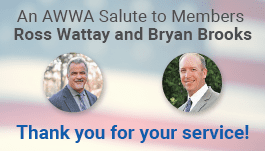U.S. military service points South Carolina veterans toward water careers
November 2, 2022

AWWA Articles
U.S. military service points South Carolina veterans toward water careers
In 1991, right after the ground campaign had ended in Desert Storm, Stinger-gunner Ross Wattay and his fellow Army crewmembers stumbled across a tomato farmer north of the Iraqi-Kuwaiti border.
The farmer had built an irrigation system by piping well water through aqueducts into rows and rows of tomatoes. After a month without a decent shower or a bathroom, “we thought we were in the most luxurious place in all of Iraq,” said Wattay (pictured left). “Because it had a hose.”
 The farmer graciously let the troops use his hose to wash up, a kind gesture that ultimately directed Wattay toward a career in water.
The farmer graciously let the troops use his hose to wash up, a kind gesture that ultimately directed Wattay toward a career in water.
“You really don’t think about water until you don’t have it,” said Wattay, field services and engineering manager at Mount Pleasant Waterworks in South Carolina. “It meant so much to us to get cleaned up. I’ll never forget that.”
Wattay’s engineering colleague at Mount Pleasant, Bryan Brooks (pictured right), retired Army lieutenant colonel, agreed.
“Early in my career, I got an appreciation for what flushing a toilet and running water means to a family,” said Brooks, who first worked as an engineering consultant in impoverished coal mining towns in southwestern Virginia.
Wattay and Brooks are among thousands of veterans who work for water utilities across the country. Because their skills and experience are so valued, the American Water Works Association has compiled a Veterans Workforce network to help members of the military secure jobs in the water industry.
It’s a good fit for both the water industry and veterans, Wattay said, because veterans have a profound desire to help others.
“When people here have service issues or can’t pay their bills, you want to help them,” Wattay said. “Water is an absolute basic necessity of life. When you experience the same thing yourself, now you know what other people are going through. You have a chance to make a difference for those in need.”
We all want the basic necessities of life
 After serving two deployments to Iraq and Afghanistan in the early 2000s, where hand-dug aqueducts brought water to the base, Brooks realized, “we’re all humans, and we all want the same things, the basic necessities of life. Running water, security, a good life for our kids.”
After serving two deployments to Iraq and Afghanistan in the early 2000s, where hand-dug aqueducts brought water to the base, Brooks realized, “we’re all humans, and we all want the same things, the basic necessities of life. Running water, security, a good life for our kids.”
Brooks grew up in a military family. Several family members, including his father, enlisted or were drafted, and his son is attending military school. Brooks went on to serve more than 30 years in the U.S. Army Reserves, a time in which he was entrusted with tremendous amounts of responsibility and endless numbers of problems to solve.
“Military members solve problems by involving the whole team, senior to the lowest level, and oftentimes that’s where the best solutions are found,” Brooks said. “With limited resources, you pull from the skill sets of all folks.”
Those problem-solving skills are crucial as water utilities navigate complex problems with limited experience to draw from, such as climate change, aging infrastructure, natural disasters, supply chain issues, a retiring workforce and more.
“We have amazing employees here who aren’t veterans, of course,” Brooks said. “But veterans have a special ability to see a problem through, and they take the time and effort and have a sense of urgency to complete something without self-recognition. They do it because of the benefit others will get from their work.
“Really, it’s reflective of our industry, whether you’re a veteran or a nonveteran. We all want to help.”
Advertisement